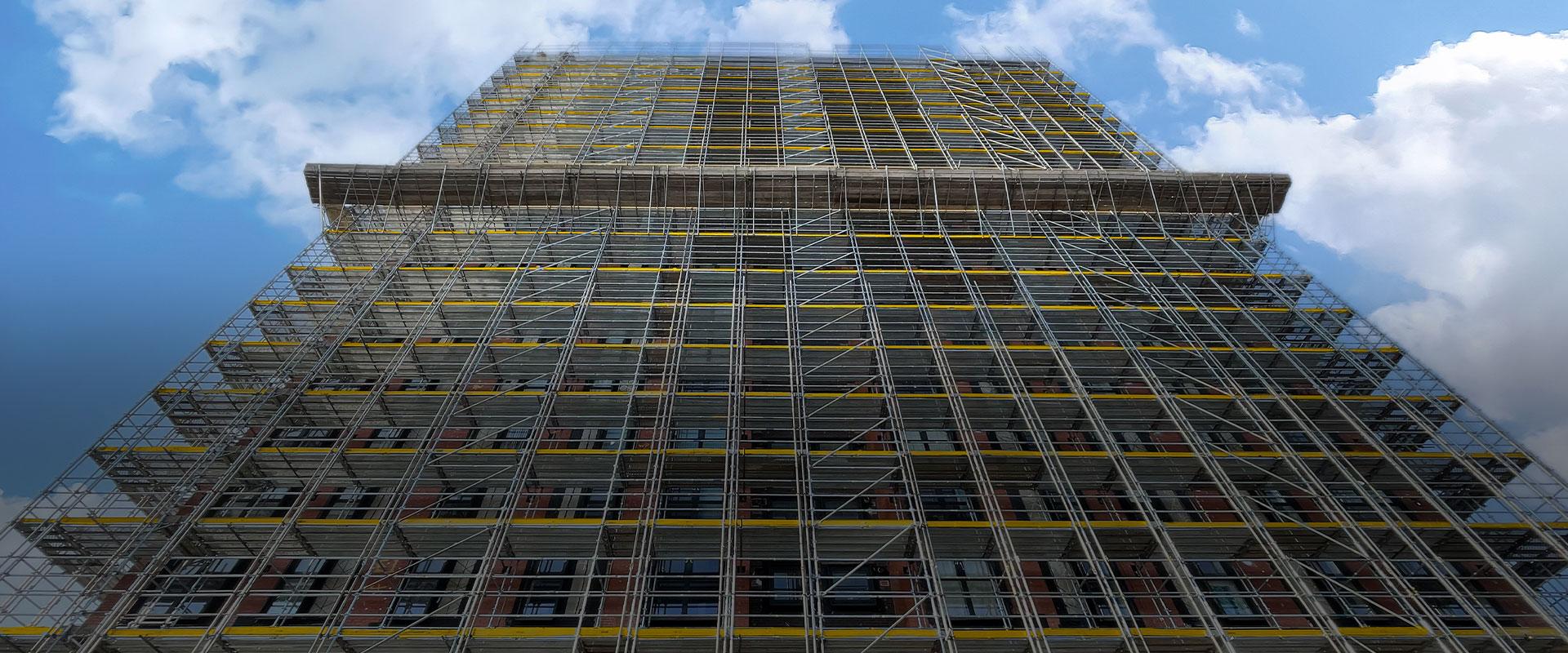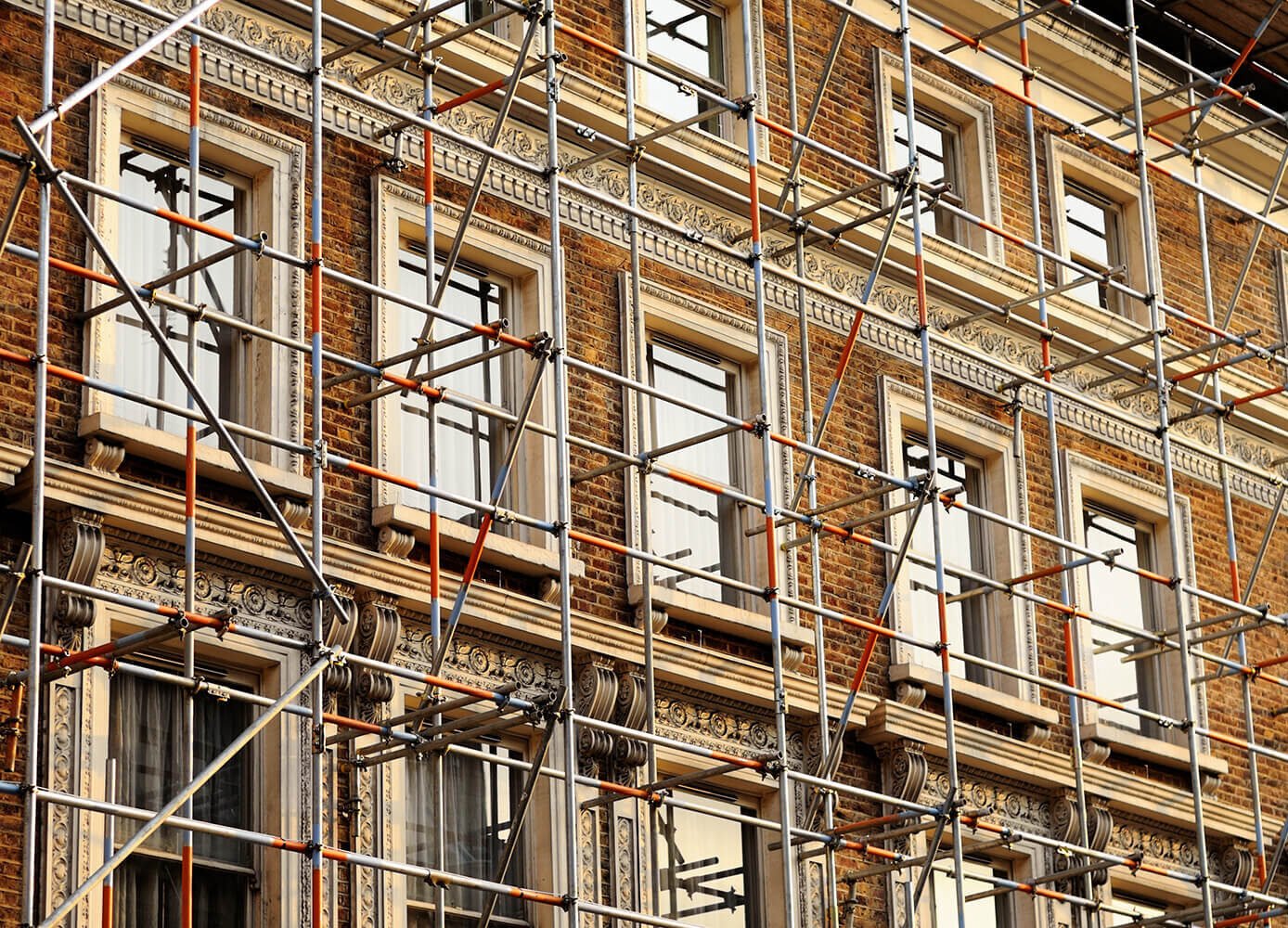Professional Scaffolder Surrey: Your Trusted Partner for Safe Installations
Professional Scaffolder Surrey: Your Trusted Partner for Safe Installations
Blog Article
Exploring the Various Kinds Of Scaffolding Made Use Of in Construction Projects
The construction market depends greatly on numerous kinds of scaffolding to meet particular job needs, each offering distinct advantages and applications. Conventional framework scaffolding gives a sturdy foundation for general jobs, while put on hold scaffolding is necessary for job on high-rise structures.

Conventional Structure Scaffolding
Standard framework scaffolding is among the most extensively used methods in the construction sector as a result of its robustness and convenience. This system is composed of vertical and straight frames that are assembled to develop a stable system for products and employees. The primary parts include upright messages, straight ledgers, and diagonal dental braces, which together supply a strong framework that can support considerable lots.
One of the essential benefits of traditional frame scaffolding is its flexibility to different construction tasks, varying from residential buildings to big business frameworks. The modular layout permits easy assembly and disassembly, making it efficient for both temporary and long-term projects. Furthermore, the system can be personalized in elevation and size, suiting various building styles and site conditions.
Security is vital in scaffolding applications, and typical structure systems are equipped with guardrails and toe boards to prevent falls and ensure worker protection. Regular examinations and adherence to safety and security laws are critical in keeping the stability of the scaffold (Scaffolding). In general, conventional frame scaffolding continues to be a basic option in the building industry, giving a reliable system for labor and improving general project performance

Suspended Scaffolding
Suspended scaffolding offers an one-of-a-kind service for building and construction projects that call for access to raised surfaces, especially in situations where standard frame scaffolding might be not practical. This type of scaffolding is typically put on hold from the roof covering or upper levels of a framework, making use of a system of systems, sheaves, and ropes to produce a functioning room that can be adjusted to different elevations.
Among the key advantages of suspended scaffolding is its versatility. It can be conveniently rearranged or decreased to accommodate changes in building and construction needs, making it suitable for jobs such as home window installation, façade work, and maintenance on skyscraper structures. In addition, the marginal impact of put on hold scaffolding enables better use ground area in metropolitan settings, where space is often limited.
Security is an important consideration in the usage of put on hold scaffolding. Generally, suspended scaffolding provides a efficient and efficient remedy for accessing hard-to-reach locations in various construction circumstances, improving both efficiency and security on site.
System Scaffolding
System scaffolding, frequently concerned as a contemporary service in the scaffolding industry, includes pre-engineered elements that can be rapidly put together and adapted for various construction projects. Scaffolding. This sort of scaffolding is identified by its modular layout, which enables flexibility and effectiveness on job websites, accommodating various heights and structural needs
Generally made from high-strength steel or light weight aluminum, system scaffolding uses enhanced toughness and stability. The parts consist of upright blog posts, horizontal journals, and diagonal dental braces, Source which adjoin safely, making certain a robust framework. The layout frequently includes standardized fittings, simplifying setting up and disassembly procedures, thereby decreasing labor time and prices.

Rolling Scaffolding
Rolling scaffolding is a functional option to conventional set scaffolding, created for movement and convenience of use on construction websites. This type of scaffolding is composed of a platform sustained by frameworks with wheels, permitting workers to easily move it as needed. The mobility her response function substantially enhances performance, as it reduces downtime connected with setting up and disassembling taken care of scaffolding.
Usually constructed from lightweight products such as aluminum or steel, rolling scaffolding uses a durable yet mobile solution for jobs calling for regular repositioning - Scaffolding. It is specifically advantageous in jobs such as painting, drywall setup, and electric job, where access to different elevations and locations is needed
Safety is extremely important in rolling scaffolding design, with functions such as securing wheels to avoid unexpected activity when being used, and guardrails to secure employees from falls. Furthermore, numerous versions are adjustable in elevation, suiting various task needs.
Cantilever Scaffolding

The style of cantilever scaffolding typically includes utilizing brackets or arms anchored to a structure like this or structure, allowing the platform to expand exterior securely. Safety is paramount; thus, these scaffolds should be engineered to stand up to various tons and ecological conditions. Routine examination and upkeep are necessary to guarantee structural honesty and worker safety.
Cantilever scaffolding is preferred for its convenience and effective use space, making it a prominent option in urban atmospheres where space restraints prevail. In addition, it assists in easier accessibility to high elevations, inevitably adding to the total performance of construction jobs. Similar to all scaffolding types, proper training and adherence to safety and security standards are important for workers utilizing cantilever scaffolding.
Verdict
Standard structure scaffolding gives stability, while suspended scaffolding supplies adaptability for elevated tasks. System scaffolding promotes fast assembly, and rolling scaffolding improves wheelchair for varying job atmospheres.
Standard structure scaffolding provides a durable structure for general jobs, while put on hold scaffolding is essential for job on high-rise structures.Rolling scaffolding is a flexible choice to typical set scaffolding, developed for mobility and simplicity of use on construction websites. As with all scaffolding types, correct training and adherence to safety criteria are essential for employees using cantilever scaffolding.
Traditional structure scaffolding gives stability, while suspended scaffolding supplies adaptability for elevated tasks. System scaffolding facilitates fast assembly, and rolling scaffolding enhances movement for varying job environments.
Report this page